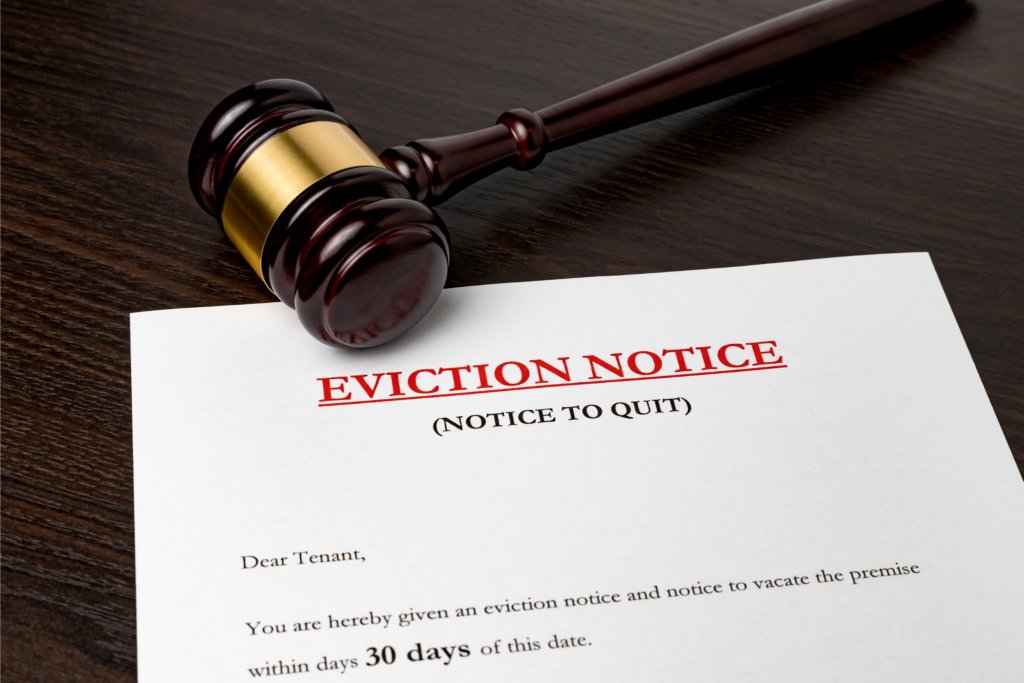Dealing with evictions can be an overwhelming and stressful experience for tenants, and it can have long-term effects on your renting opportunities. It’s essential to have a clear understanding of the eviction process, your tenant rights, and how an eviction record can impact your future rental prospects.
In this article, we will provide you with an in-depth guide on the eviction process, including legal steps involved, eviction timeline, and notification requirements. We will also delve into the implications of an eviction on your future renting opportunities and explore tenant rights, fair eviction practices, and resources available to support you.
Key Takeaways:
- The eviction process is a legal procedure that involves specific steps and timelines that landlords must follow.
- An eviction record can negatively impact your credit score and rental history, making it more challenging to secure future housing.
- Tenants facing eviction have legal rights, such as the right to due process and to seek legal assistance.
- Second chance apartments may offer renting opportunities for individuals who have experienced an eviction.
- Seeking legal assistance from lawyers specializing in eviction cases can be beneficial in protecting tenant rights and providing legal counsel.
Understanding the Eviction Process

When facing an eviction, it’s crucial to understand the legal process involved. Every state has its own set of eviction laws, which can make the process confusing and overwhelming. However, overall, the eviction process follows a few essential steps.
- Notice of Eviction: Before an eviction can proceed, the landlord must serve the tenant with a notice of eviction. The amount of time given can vary by state and reason for eviction.
- Summons and Complaint: If the tenant does not vacate the property after the notice period has elapsed, the landlord can file a summons and complaint with the court. A hearing will be scheduled, and both parties will have an opportunity to present their case.
- Writ of Possession: If the court rules in favor of the landlord, a writ of possession will be issued. This allows the sheriff’s office to forcibly remove the tenant and their belongings from the property.
- Appeal: In some cases, the tenant may choose to appeal the court’s decision. However, this can be a lengthy and expensive process.
It’s essential to understand that tenants have rights during the eviction process. For example, tenants have the right to receive proper notice and must be given an opportunity to respond to the landlord’s complaint. Additionally, tenants have the right to a fair and reasonable rent, safe and habitable housing, and freedom from unlawful discrimination. Understanding your rights can help you protect yourself and your home.
Renting After Eviction: Challenges and Opportunities
Experiencing an eviction can be a challenging and tumultuous event, with significant consequences that can affect your renting opportunities. Trying to rent after eviction can seem overwhelming, but it’s not impossible.
One of the biggest challenges of renting after eviction is the potential damage to your rental history and credit score. An eviction can appear on your record and could be seen as a red flag by landlords, who may view you as a risky applicant. Moreover, rental applications often require detailed rental history, and you may find it challenging to secure housing if you have gaps or irregularities in this record.
However, it’s important to note that tenants have eviction rights, which can provide some protection and help offset the potential consequences of eviction. For instance, tenants have the right to due process, which means that the eviction must follow the legal eviction process and adhere to relevant eviction laws. Tenants also have the right to challenge the eviction and dispute the reasons for the eviction, if necessary.
Additionally, there are several strategies that you can use to improve your chances of renting after eviction. For example, you can provide references from previous landlords who can vouch for your reliability and payment history. You can also explain the circumstances surrounding the eviction and provide any relevant documentation that supports your case.
Overall, while there are certainly challenges to renting after eviction, it’s possible to overcome them with the right approach and mindset. By understanding your eviction rights and taking steps to mitigate the impact of the eviction on your record, you can increase your chances of finding suitable housing and moving forward successfully.
The Impact of an Eviction Record on Future Renting
An eviction record has a significant impact on your future renting prospects. Landlords and property managers may view an eviction record as a red flag, indicating a potential unwillingness or inability to pay rent on time. This can make it challenging to secure housing, especially in highly competitive rental markets.
However, it’s essential to remember that an eviction record does not automatically disqualify you from renting a property. Landlords and property managers must adhere to fair housing laws and cannot use an eviction record as the sole determinant of your eligibility to rent.
If you have an eviction record, it’s crucial to be upfront with potential landlords or property managers about your history. Honesty and transparency can go a long way in building trust and credibility.
If you’re struggling to find a rental property due to an eviction record, there are strategies you can use to increase your chances of success. These can include:
- Seeking out landlords who specialize in renting to tenants with an eviction history
- Providing additional references or proof of income to demonstrate your financial stability
- Offering to pay a higher security deposit or sign a lease with a shorter term
Remember, an eviction record does not have to define your future renting opportunities. By taking steps to address your eviction history and finding ways to mitigate the impact, you can still secure housing and move forward with your life.
Understanding Tenant Rights in Eviction Cases

Tenant rights are crucial when it comes to facing an eviction. As a tenant, you are entitled to certain protections and due process. Understanding your rights can help you make informed decisions and take action when necessary.
Overview of Tenant Rights
When facing an eviction, tenants have the right to:
- Receive written notice of the eviction
- Reasonable time to vacate the property
- Challenge the grounds for eviction in court
- Defend themselves against the eviction in court
It’s important to note that eviction proceedings must follow a fair process, regardless of the circumstances surrounding the eviction. The landlord must follow all relevant eviction laws and procedures and cannot take retaliatory actions against tenants for asserting their rights.
Resources Available to Tenants
If you are facing an eviction and believe your rights are being violated, there are resources available to assist you. These resources include:
- Legal aid organizations that provide free or low-cost legal assistance to tenants
- Housing counseling agencies that offer support and guidance to tenants
- Tenant unions or organizations that advocate for tenant rights
It’s important to seek out these resources early in the eviction process to increase your chances of a successful outcome.
You may also like: What is a Broken Lease and How Does it Affect You?
Navigating the Rental Eviction Process: Steps and Considerations
The rental eviction process can be stressful and confusing for tenants, but it’s important to understand the steps involved to best protect your rights. Here are some key considerations to keep in mind:
Step 1: The Notice
The eviction process typically begins with a notice from your landlord. This notice will explain why you are being evicted and how much time you have to vacate the premises. It’s crucial to read this notice carefully and make note of any deadlines or expectations.
Step 2: Consult with an Attorney
If you receive an eviction notice, consider consulting with an attorney who specializes in eviction cases. They can help you understand your rights and provide guidance on the next steps to take.
Step 3: Respond to the Notice
Once you receive an eviction notice, you have the opportunity to respond. This can involve challenging the eviction in court, negotiating with your landlord, or simply vacating the premises by the deadline provided in the notice.
Step 4: Attend Court if Necessary
If you and your landlord cannot reach an agreement, the case may go to court. This involves presenting evidence and arguments to a judge who will ultimately decide the outcome of the case. It’s important to attend any court proceedings and to present your case effectively.
Step 5: Vacate the Premises
If a judge rules in favor of your landlord, it’s important to vacate the premises by the deadline provided. Failure to do so can result in additional legal consequences.
Remember, tenants have rights throughout the eviction process, including the right to due process and fair treatment. By understanding the steps involved, consulting with legal professionals when necessary, and advocating for your rights, you can navigate the rental eviction process with confidence.
You may also like: How To Move Out of Apartments Before The Lease Term is Over
Second Chance Apartments: Renting Opportunities After Eviction
If you’ve had an eviction on your record, finding a new place to live can feel daunting. However, second chance apartments offer a ray of hope for those seeking a fresh start.
Second chance apartments are rental properties that cater specifically to individuals who may have experienced financial difficulties or other challenges in the past, such as an eviction. These apartments typically have more flexible application criteria, allowing for a fair appraisal of each tenant’s unique situation.
To find second chance apartments in your area, consider working with a reputable property management company that specializes in these types of rentals. Additionally, online directories and classified ads can be a valuable resource in your search.
| Criteria Considered by Second Chance Landlords | How They Help Applicants |
|---|---|
| Rental history | Allows tenants to explain their past circumstances and demonstrate their efforts to improve their financial standing |
| Income verification | Considers alternative forms of income, such as child support or disability payments, and allows for co-signers on the lease |
| Criminal history | Conducts an individualized assessment to weigh the severity and relevance of past criminal charges |
Remember, while second chance apartments provide valuable renting opportunities, they aren’t a guarantee of approval. Be prepared to complete a thorough application and communicate openly with potential landlords about your situation. With perseverance and a positive attitude, securing a second chance apartment can be the first step towards a bright housing future.
Seeking Legal Assistance for Eviction Cases
When facing an eviction, seeking legal assistance can be a crucial step in protecting your rights as a tenant. Consulting with an attorney who specializes in eviction cases can provide you with essential guidance and support throughout the eviction process.
The benefits of legal representation
An attorney can help you understand your legal rights, navigate complex eviction laws, and represent you in court. With legal representation, you may be better equipped to negotiate with your landlord or fight an unjust eviction.
Resources for tenants in need of legal aid
If you require legal aid but cannot afford an attorney, there are resources available to help. Nonprofit organizations, legal aid centers, and pro bono lawyers can provide you with free or low-cost legal services.
Finding affordable legal representation
If you are seeking affordable legal representation, start by contacting your nearest legal aid center. You can also search for pro bono lawyers in your area, or ask for referrals from your local bar association.
“Consulting with an attorney who specializes in eviction cases can provide you with essential guidance and support throughout the eviction process.”
Remember, seeking legal assistance can be crucial to protecting your rights and securing a fair outcome in your eviction case. Don’t hesitate to reach out for help when you need it.
Conclusion
Facing an eviction can be a challenging and distressing experience, but it is important to remember that you have rights and resources available to you. By understanding the eviction process and tenant rights, as well as taking steps to address an eviction record and seeking legal assistance when necessary, you can navigate this difficult time with confidence and empowerment.
Although an eviction may feel like the end of the road, it is important to remember that there are second chance apartments and other renting opportunities available to you. By staying informed and persistent, you can overcome the challenges of an eviction and move forward towards a brighter future.
Remember, an eviction does not define you. You have the power to take control of your situation and create a positive outcome. Keep pushing forward and seeking solutions, and you will find the renting opportunities that you deserve.

 We are Licensed Texas Real Estate Agents who help individuals with Bad credit, Bankruptcy, Broken leases, Evictions, and felonies locate quality housing. We even assist first-time renters as well. With years of experience, we have developed special relationships with multiple apartment complexes located in Texas.
We are Licensed Texas Real Estate Agents who help individuals with Bad credit, Bankruptcy, Broken leases, Evictions, and felonies locate quality housing. We even assist first-time renters as well. With years of experience, we have developed special relationships with multiple apartment complexes located in Texas.
Leave a Reply